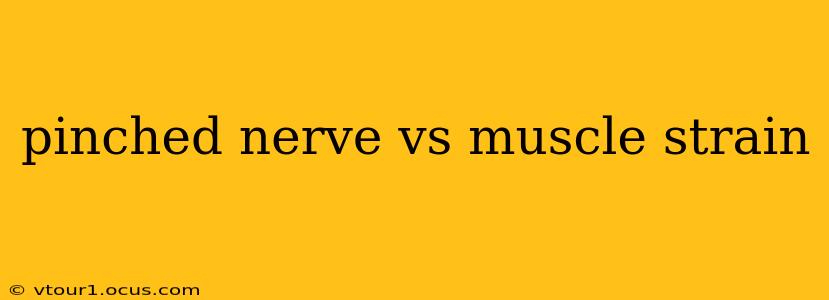Experiencing pain in your back, neck, or limbs can be debilitating, leaving you wondering if it's a pinched nerve or a muscle strain. While both conditions cause discomfort, their underlying causes and symptoms differ significantly. This guide will help you differentiate between a pinched nerve and a muscle strain, enabling you to seek appropriate treatment and relief.
What is a Pinched Nerve?
A pinched nerve, also known as a compressed nerve, occurs when surrounding tissues, such as bones, cartilage, muscles, or tendons, put pressure on a nerve. This pressure interferes with the nerve's ability to send signals, resulting in pain, numbness, tingling, or weakness in the affected area. The location of the pinched nerve dictates the symptoms; for instance, a pinched nerve in the neck (cervical radiculopathy) might cause pain radiating down the arm, while a pinched nerve in the lower back (lumbar radiculopathy) may cause sciatica.
Common Causes of a Pinched Nerve:
- Spinal Stenosis: Narrowing of the spaces within your spine.
- Herniated Disc: A rupture in the cushioning discs between vertebrae.
- Osteoarthritis: Degeneration of the cartilage in joints.
- Spondylolisthesis: Forward slippage of one vertebra over another.
- Repetitive movements or poor posture: These can put extra stress on nerves over time.
- Injuries: Sudden impact or trauma can directly compress a nerve.
What is a Muscle Strain?
A muscle strain, also known as a pulled muscle, involves an injury to a muscle or its tendon. This usually occurs due to overstretching or tearing of the muscle fibers. The severity of a muscle strain can range from mild (minor discomfort) to severe (complete muscle tear).
Common Causes of a Muscle Strain:
- Overexertion: Lifting heavy objects improperly or engaging in strenuous physical activity without proper warm-up.
- Sudden movements: Twisting or reaching awkwardly can strain muscles.
- Poor physical condition: Weak or inflexible muscles are more prone to strains.
- Repetitive motions: Repeatedly performing the same movements can lead to cumulative muscle strain.
Pinched Nerve vs. Muscle Strain: Key Differences
| Feature | Pinched Nerve | Muscle Strain |
|---|---|---|
| Cause | Compression of a nerve | Overstretching or tearing of muscle fibers |
| Pain | Sharp, shooting, burning, or electric pain | Dull, aching pain, often localized to the muscle |
| Numbness/Tingling | Common | Less common |
| Weakness | Often present | May be present, depending on the severity |
| Range of Motion | May be limited due to pain | May be limited due to pain and muscle spasm |
| Location of Pain | Can radiate down the limb | Usually localized to the affected muscle |
How are Pinched Nerves and Muscle Strains Diagnosed?
Diagnosis typically involves a physical examination, where a doctor evaluates your range of motion, reflexes, and sensory function. Imaging tests, such as X-rays, MRIs, or CT scans, may be necessary to confirm the diagnosis, particularly in cases of suspected pinched nerves. For muscle strains, a physical exam usually suffices.
What are the Treatment Options?
Treatment for both conditions often involves conservative measures, including:
- Rest: Avoiding activities that aggravate the pain.
- Ice: Applying ice packs to reduce inflammation (especially helpful for muscle strains).
- Heat: Applying heat can help relax muscles (generally used after the initial inflammation subsides for muscle strains).
- Over-the-counter pain relievers: Ibuprofen or acetaminophen can help manage pain and inflammation.
- Physical therapy: To improve range of motion, strengthen muscles, and improve posture.
In severe cases, a pinched nerve may require more intervention, such as injections or surgery. Severe muscle strains may also necessitate surgical repair.
Can a Muscle Strain Mimic a Pinched Nerve?
Yes, sometimes the symptoms of a muscle strain can overlap with those of a pinched nerve, making accurate self-diagnosis challenging. The radiating pain associated with a pinched nerve can be mistaken for the pain of a severe muscle strain. This highlights the importance of seeking professional medical evaluation to receive an accurate diagnosis and appropriate treatment plan.
What are the Long-Term Effects?
Both pinched nerves and muscle strains can have long-term effects if not properly managed. Untreated pinched nerves can lead to chronic pain, weakness, and potentially permanent nerve damage. Untreated muscle strains can result in chronic pain, muscle weakness, and reduced range of motion. Early and proper management is key to mitigating these risks.
Remember, this information is for educational purposes only and should not replace professional medical advice. If you are experiencing pain, numbness, or weakness, it's crucial to consult a doctor or physical therapist for a proper diagnosis and treatment plan.
